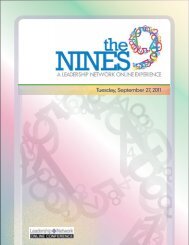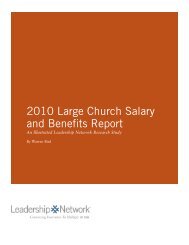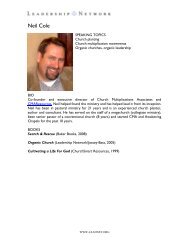ARE WE A PEOPLE AT HALF TIME? - Leadership Network
ARE WE A PEOPLE AT HALF TIME? - Leadership Network
ARE WE A PEOPLE AT HALF TIME? - Leadership Network
You also want an ePaper? Increase the reach of your titles
YUMPU automatically turns print PDFs into web optimized ePapers that Google loves.
and the buster generation is making the<br />
same attempt in the late 1990’s. Are not<br />
youth usually the source of cultural<br />
innovation<br />
If we take the long view of religious history,<br />
worship forms are always changing in<br />
response to cultural change, and the groups<br />
that are growing are those that appropriate<br />
the symbols of the new culture in communicating<br />
their truth.<br />
NEXT...Is it too simplistic to say that<br />
“new paradigm” churches have found a<br />
way to make the message culturally<br />
appropriate and mainline churches have<br />
not<br />
MILLER...It is not just the packaging that<br />
is important. The question is whether the<br />
people, including the clergy, are having<br />
life-transforming experiences in worship.<br />
Are these churches, and their clergy, mediating<br />
deeply moving experiences of the<br />
sacred<br />
NEXT...You write that ritual churches<br />
will grow if the sacred is encountered.<br />
Do you see evidence of that happening in<br />
the more liturgical churches<br />
MILLER...Yes. My own local Episcopal<br />
church is currently exploding with growth<br />
and I credit this to a dynamic and innovative<br />
worship. Also, liturgy, when done<br />
well, can provide the space for people to<br />
experience the transcendent—even in<br />
moments of silence.<br />
NEXT...You suggest that these three<br />
movements plus the independent<br />
churches and seeker-sensitive churches<br />
combine to make this a post-denominational<br />
era. Yet, are these “new paradigm”<br />
churches not creating new denominations<br />
MILLER...The inevitable sociological<br />
trend is that sects become denominations,<br />
or, stated differently, that charisma<br />
becomes routinized. And so it is not<br />
surprising that the Vineyard has declared<br />
itself a denomination. Nevertheless, I think<br />
we are learning that innovation is often<br />
most explosive in decentralized organizations,<br />
whether it be a corporation or a<br />
church.<br />
NEXT...You write that the primitive<br />
model inevitably evolves toward<br />
denominationalism. Do you believe this<br />
will happen with the new paradigm<br />
churches in a postmodern world where<br />
the organizational structures and<br />
culture are very different than the<br />
modern world<br />
MILLER...You make a good point. I think<br />
we are learning a lot about the deficits of<br />
hierarchical, pyramid styles of layered<br />
bureaucracies. It is very possible that<br />
“networks” may be the organizational<br />
structure of the future.<br />
NEXT...You characterize new paradigm<br />
pastors as restless, individualistic and<br />
entrepreneurial. What other observations<br />
would you make of these senior pastors<br />
MILLER...They are voracious learners<br />
and they seek information from a variety of<br />
sources. Also, they do not use traditional<br />
ways of getting information. They read<br />
books but also will hire a consultant to<br />
come in and teach them something. They<br />
are very culturally savvy. They read the<br />
culture intuitively, not through a text book,<br />
and understand it backwards and forwards.<br />
Also, their internal drive comes from the<br />
fact that their lives have been transformed<br />
and currently are in process of change.<br />
Therefore, they have something to share.<br />
NEXT...Len Sweet (historian/theologian/author)<br />
recently remarked that this<br />
is the only spiritual awakening in<br />
American history that is being led more<br />
by the culture than the church. Do you<br />
agree and what is the role of the new<br />
paradigm churches in this awakening<br />
Or are they merely reflective of it<br />
MILLER...I don’t think one can so neatly<br />
separate the church from culture. On the<br />
other hand, I don’t see this awakening as<br />
being a new message-as was true in the<br />
Reformation-but rather a change in the<br />
medium through which the message is<br />
addressed. The message is not innovative<br />
but it is more in the medium of how it<br />
is expressed. It is both the medium and<br />
the messenger in the form of these new<br />
pastors.<br />
There is no single route to second half<br />
significance, no formula that always<br />
works for every person. Instead, there are<br />
multiple pathways that could be a part of<br />
your overall journey. Here are eight ways<br />
to pursue significance in the second half<br />
of your life.<br />
EIGHT P<strong>AT</strong>HS TO SECOND <strong>HALF</strong><br />
INVOLVEMENT<br />
Volunteer<br />
Donate substantial time and energy to a<br />
cause you deem significant.<br />
Be a donor<br />
Contribute financial resources to a cause<br />
you deem significant.<br />
Use your business as a ministry<br />
Use your enterprise to accomplish<br />
Kingdom work even as you pursue your<br />
core business.<br />
Become a board member<br />
Provide leadership and expertise to a<br />
nonprofit organization that has a mission<br />
you deem significant.<br />
Partner<br />
Team up with someone involved full time<br />
in a cause you deem significant, acting as a<br />
silent partner to provide resources to that<br />
individual in whatever ways are needed to<br />
accomplish meaningful results.<br />
Establish a parallel career<br />
Take on executive responsibility for a cause<br />
you deem significant, even as you continue<br />
to carry out your vocational<br />
commitments.<br />
Become an organizational leader<br />
Make a fundamental career change by<br />
becoming the executive of an established<br />
organization that has a mission you deem<br />
significant.<br />
Become a social entrepreneur<br />
Use your entrepreneurial expertise and<br />
experience to start and build a nonprofit<br />
initiative designed to meet a societal need<br />
in an innovative way.<br />
4







